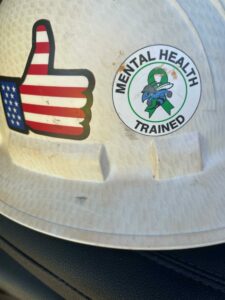Plateau Excavation
The most effective tool we have is the one between our ears. Head protection has come a long way since the days of leather and canvas hard hats. Keeping hard hats on at all times is important. Just as important as keeping our brains safe physically is ensuring we take care of our mental health. May is National Mental Health Awareness Month. One in five construction workers has faced challenges like anxiety, depression, or substance abuse. Fighting the stigma surrounding mental health issues helps all of us stay stronger and safer together.
Experiencing tough times or mental health issues is far more common than most think, especially in our industry. That’s why it’s so important that workers feel connected and supported on the job, and that they are in a safe space where they can share their struggles or reach out for help. By bringing more awareness and acceptance of mental health to our safety culture industry- wide, we can ensure that no one feels they have to face their struggles alone. Learning as much as we can about mental health is a great first step towards normalizing the conversation, breaking the stigma and keeping everyone safe.
So how can those in the construction industry struggling with higher levels of stress and anxiety deal with stress and mental health issues?
1. SHARE
Share with at least one person what’s really going and how you are feeling. Even write it down. Sometimes writing down what is causing anxiety can make the thoughts less daunting and severe. This may also assist in you finding patterns to anxious thoughts to be better able to combat them in the future.
2. EXERCISE
Though jobs in this industry are demanding, people still all need to exercise. Exercise reduces the levels of the body’s stress hormones, such as adrenaline and cortisol. Plus, it stimulates the production of endorphins, chemicals in the brain that are the body’s natural painkillers and mood elevators. Set a step goal daily or find an exercise routine that fits your schedule. Just 15-30 minutes a day is better than nothing!
3. READ OR LISTEN TO POSITIVE MATERIAL
Read something uplifting and positive. Listen to positive songs or a podcast. Putting positivity in will help you put positivity out. If you are feeling anxious, combat the nervousness with calming techniques such as a meditation app or listening to music.
4. ACTS OF KINDNESS
Simple things like complimenting a colleague one goes a long way. Maybe reach out to an old friend or loved one. Hold the door open for someone. Say thank you. We are all going through things. Acts of kindness and helpings turns the attention away from us and to others.
5. ASK FOR HELP
If you are struggling with anxiety or depression, you are not weak or inferior. Mental health matters, and help is available. Nobody knows a person is suffering if they don’t ask for help.
At Plateau Excavation, this sticker on hard hats shows all our employees who they can confide in and have an open, judge-free conversation with. Those with this sticker have gone through a 2-day mental health first aid training and are available for those to speak to on all job sites.
YOU ARE NOT ALONE: WHERE TO GO FOR HELP
Crisis Resources
- National Suicide Prevention Lifeline: 1-800-273-8255 (Press 2 for Spanish)
- Crisis Text Line: Text HOME to 741741 (to connect with a Crisis Counselor)
- Veterans Crisis Line (call, chat or text) 1-800-273-8255, Press 1 or https://www.veteranscrisisline.net/
- Crisis Service Canada: 1-833-456-4566
Additional Support Resources
- NAMI Help Line
- Call: 1-800-950-6264
- Text NAMI to 741-741
- NAMI Connection Recovery Support Groups
- NAMI Support Groups (for individuals or family members)
- Substance Abuse & Mental Health Services Administration
